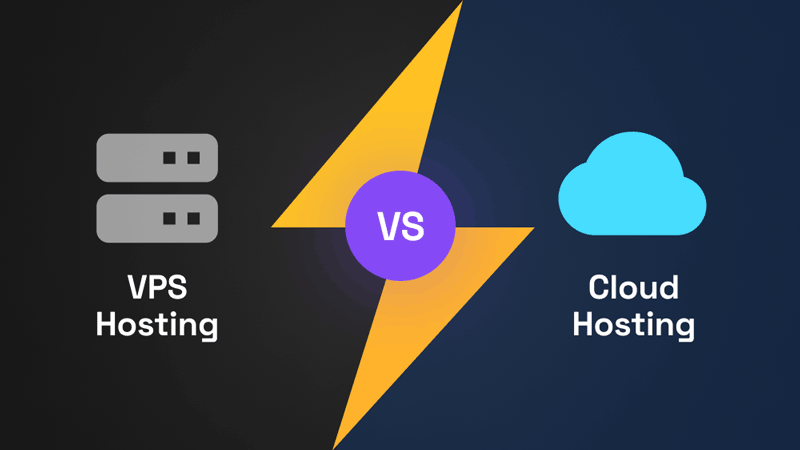Table of Contents
As a creative artist and designer, your passion lies in capturing stunning visuals, crafting appealing products, and sharing your unique vision with the world. However, selling your artistic creations online can be a daunting task given the myriad of eCommerce platforms available today. Each platform offers distinct features, benefits, and drawbacks, making it essential to choose the one that best aligns with your needs and goals.
Before launching your online store, it’s crucial to explore the various popular eCommerce platforms to find the perfect fit for showcasing and selling your art. Whether you prioritize ease of use, customization options, or marketing tools, there is a platform out there that will help you reach your audience and turn your passion into profit.
This article delves into the top eCommerce platforms for artists, providing insights and comparisons to guide you in selecting the ideal platform for your creative business.
1. Shopify

Offers an intuitive setup, customizable themes tailored for art and photography, seamless integration with social media and marketplaces, a robust app store for added functionality, and a mobile app for easy management and growth tracking, all starting with a cost-effective trial and affordable plans.
- Supports business scaling comprehensively.
- Integrates marketing with Google Ads and social media.
- Provides numerous learning materials for beginners through Shopify
- Offers a dedicated payment gateway with discounts.
- Enables multi-channel selling across various platforms.
- Enhances website functionality with a variety of add-ons and plugins.
- Delivers excellent support from a wide selection of ecommerce site-building experts.
- Adds extra costs for plugins and advanced themes.
- Charges transaction fees if not using the integrated payment option.
- Limits access to Shopify building tools unless on higher-tier packages.
- Requires a higher-tier plan for advanced features like state-of-the-art reporting and analytics.
- Sell commissions, digital art pieces, or physical items depending on your creative business needs.
- Simplify setup with a range of customizable themes specifically designed for artistic brands.
- Integrate marketing with Google Ads and social media platforms.
- Offer a dedicated payment gateway with discounts.
- Enable multi-channel selling across various platforms.
- Start with pricing at around $29 per month for the Basic plan.
- Upgrade to higher-tier packages like Shopify for $79 per month and Advanced for $299 per month for more advanced features.
2. Squarespace
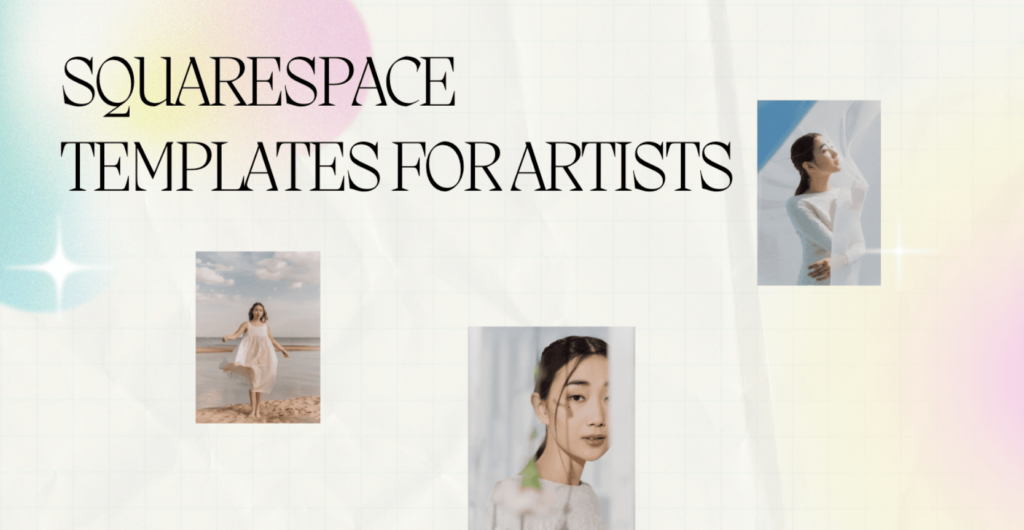
Squarespace empowers artists to showcase their creative works through its visually stunning website templates, intuitive drag-and-drop builder, seamless integration with print-on-demand services, and powerful marketing tools, making it an exceptional ecommerce platform for artists to establish a professional online presence, captivate their audience, and efficiently sell their artwork.
- Delivers high-quality, aesthetically-appealing websites favored by creative professionals.
- Focuses on visual appeal, ideal for showcasing artwork and creations effectively.
- Enables creation of entire galleries to spotlight work quickly.
- Provides access to tools for taking commissions, scheduling appointments, and selling digital or physical products.
- Offers beautiful themes tailored for visually-focused sellers.
- Integrates seamlessly with social media platforms to expand reach.
- Includes a free custom domain with annual plans.
- Limits options for payment processing methods.
- Lacks a drag-and-drop interface for intuitive customization.
- Requires upgrading beyond the £10 per month plan for ecommerce functionality.
- Does not have an app market for adding extra functionalities.
- Delivers high-quality, aesthetically-appealing websites
- Offers visual-focused sites
- Provides access to built-in tools
- Offers a 14-Day Free Trial
- Facilitates easy promotion and sharing of artwork across various platforms.
- Ensures secure transactions for all plans, safeguarding artist and customer data.
- Streamlines the process for artists managing client interactions and sales.
- Lacks an app market for extra functionality
3. BigCommerce
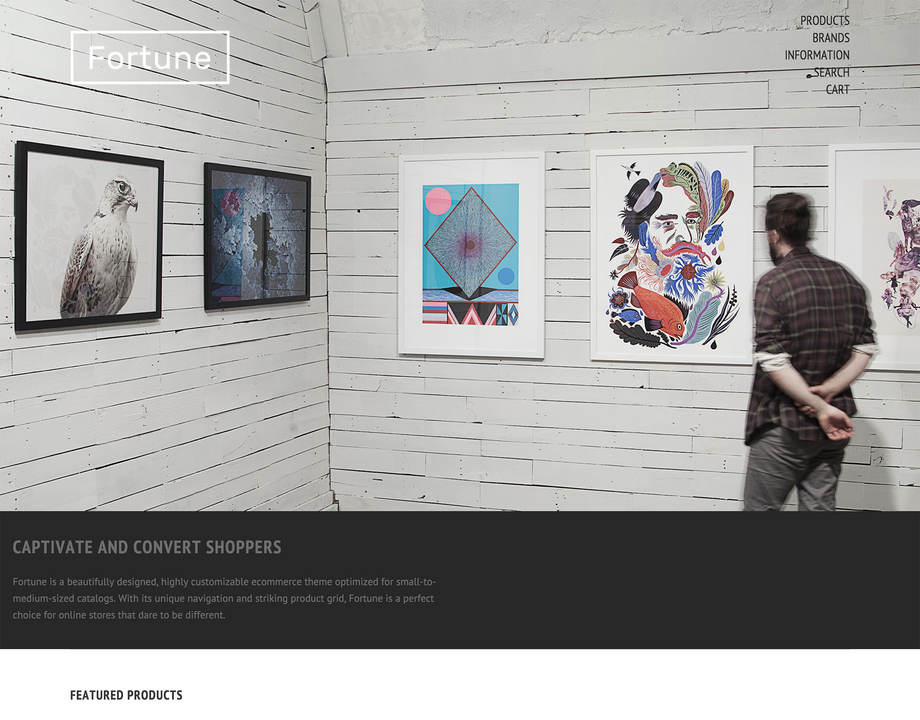
BigCommerce stands out as an exceptional choice for artists seeking to showcase and sell their creative works online, offering powerful features, scalable options, and integration with major social media platforms.
- Includes built-in tools for visual merchandising
- Eliminates transaction fees
- Allows unlimited products, storage, and bandwidth
- Enhances the functionality of your eCommerce store without additional costs.
- Presents complexity for beginners
- Provides limited themes
- Requires time investment
- Enables selling across platforms like Pinterest, Instagram, and Amazon, expanding reach.
- Provides round-the-clock support to assist artists at any time.
- Comes with everything needed to build a successful website without relying on plugins and extensions.
- Helps artists scale their business to sell prints across the globe.
4. WooCommerce
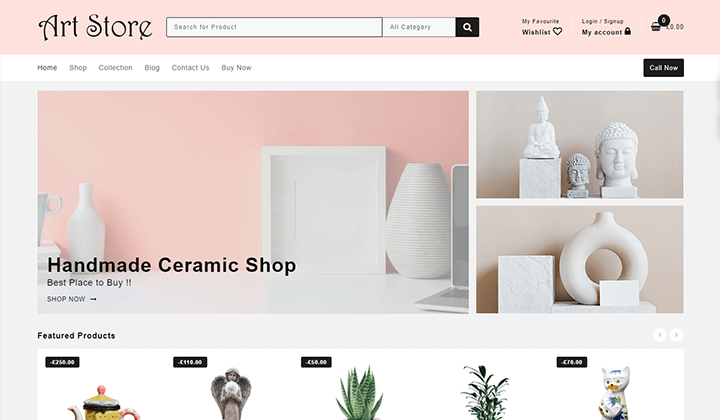
Providing unmatched versatility, WooCommerce allows artists to create a highly customized and feature-rich online store, leveraging the full WordPress plugin and theme directory, and supporting omnichannel sales strategies, unlimited products, and seamless social media integrations.
- Enables complete customization for selling features and products, tailored to artistic needs.
- Allows artists to add extra functionality easily from a vast array of plugins.
- Offers affordable access to online selling, with no initial fees for the WooCommerce plugin itself.
- Provides extensive design freedom, allowing creative sellers to craft unique storefronts.
- Offers a wide selection of themes to enhance visual appeal and branding.
- May require some technical knowledge to use correctly, especially for advanced customization.
- Can get expensive with added extras like premium themes, plugins, and transaction fees.
- Requires additional costs for website hosting and managing premium themes and plugins.
- Provides complete customization for selling features and products, allowing artists to tailor their online stores to their unique needs.
- Offers the ability to add extra features from thousands of plugins, empowering artists to enhance the functionality of their stores.
- Grants lots of design freedom for creative sellers, enabling artists to create visually appealing and brand-aligned online stores.
- Offers a wide selection of themes, giving artists a variety of options to choose from to showcase their artwork.
- Maintains an easy-to-use environment, making it accessible even for artists with limited technical knowledge.
PRO TIPS >>> Bootstrap Studio Website Builder Review
5. BigCartel
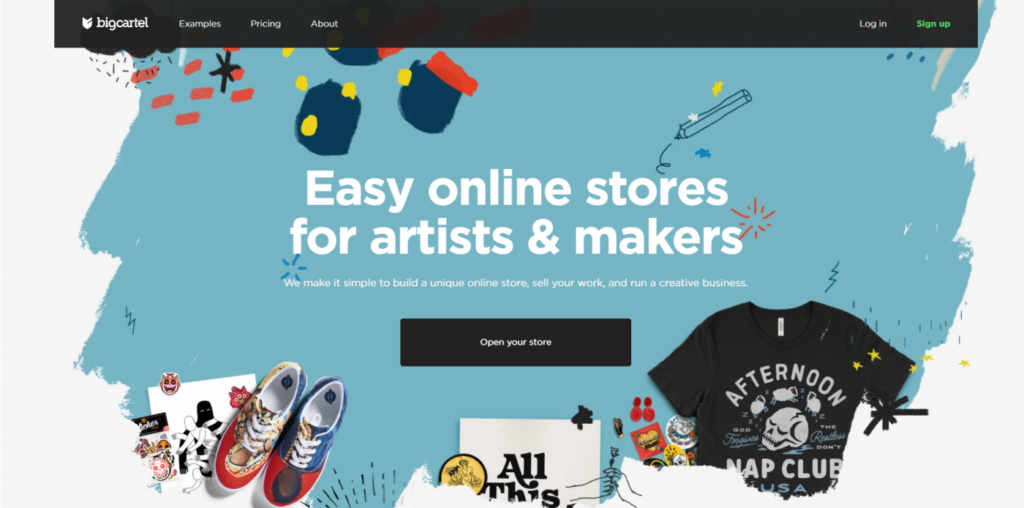
Offering simple yet powerful features, BigCartel is one of the best ecommerce platforms for artists, allowing them to create user-friendly, visually appealing stores with seamless mobile responsiveness and easy integration with payment gateways and social media.
- Offers tons of free, customizable themes tailored for selling art.
- Allows deeper code customization for more unique stores.
- Enables selling both online and in person with synced inventory.
- Tracks shipments and use real-time statistics to understand your audience.
- Includes sales tax automation on higher-tier plans.
- Provides a free package to start selling up to 5 products.
- Lacks scalability compared to other platforms like Shopify.
- Limits advanced features and customization on lower-tier plans.
- Restricts image usage per product on the free plan.
- Falls short for larger businesses needing more robust solutions.
- Sync your inventory across online and offline environments, ensuring seamless sales management.
- Leverage built-in features to offer discounts and promotions, enhancing your marketing strategies.
- Enjoy an exceptionally user-friendly platform, though note it may not be as scalable as options like Shopify.
- Start with a free plan (Gold) to sell up to 5 products, or choose from paid packages starting at $9.99 per month for additional features.
- Avoid extra costs with plans that include all advanced features without listing fees, even for the most expensive package at $19.99 per month.
6. Wix
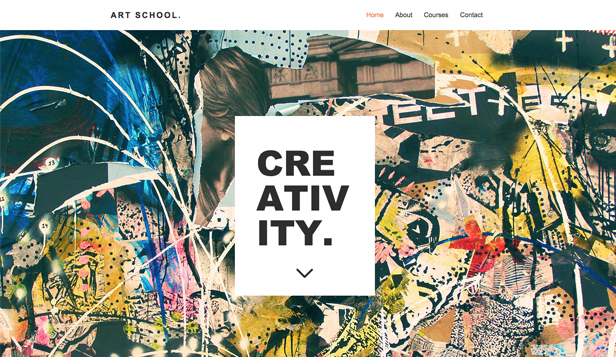
Wix, a popular eCommerce platform for artists, empowers creatives with a drag-and-drop builder and customizable templates to effortlessly create stunning online art stores, enhanced by features like the Wix Art Store app and Wix Pro Gallery for seamless digital and printed artwork sales and protection.
- Provides great customization options with good-looking templates.
- Offers seamless integrations with tools like Google Analytics.
- Features lots of plugins and apps through a dedicated app store.
- Ensures secure payment options for transactions.
- Enables reviews and dropshipping functionalities.
- Face some limitations in ecommerce functionality compared to competitors.
- Experience difficulties in changing templates once chosen.
- Features a wide array of plugins and apps to enhance functionality, from SEO tools to marketing apps.
- Requires a business or ecommerce plan starting at £13 per month to sell online, offering unlimited bandwidth and secure online payments.
- Offers Business Unlimited for expanded storage space and automated sales tax management.
- Includes Business VIP at £22 per month with priority customer care and review support.
7. Sellfy
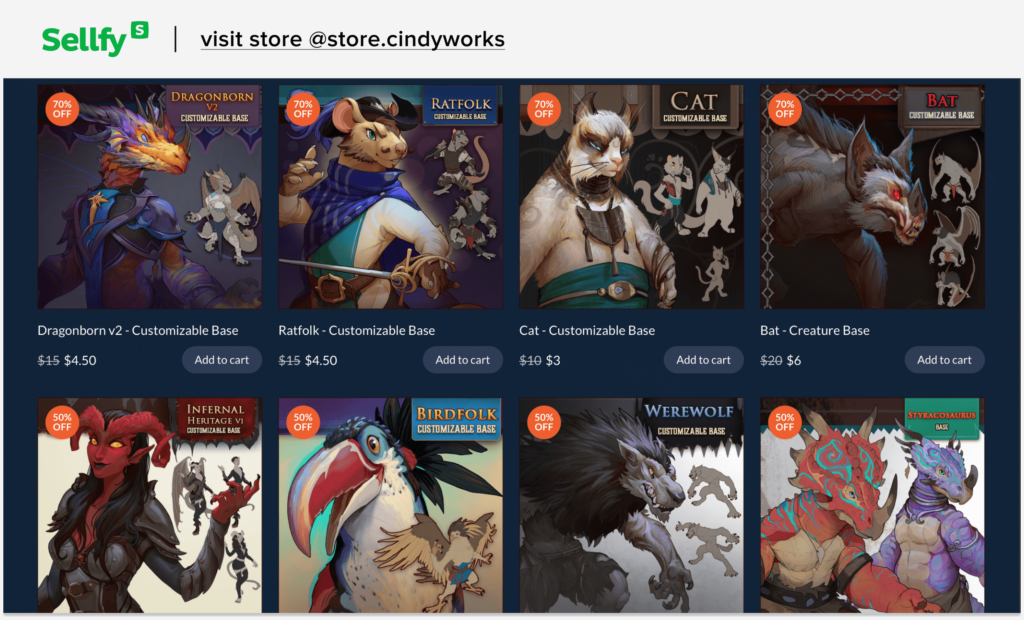
Sellfy empowers artists to effortlessly create an online storefront, sell a wide range of digital and print-on-demand products without any coding expertise, leverage its intuitive marketing tools to grow their customer base and revenue, and enjoy a hassle-free ecommerce experience that allows them to focus on their creative pursuits.
- Enables quick setup of an art gallery or marketplace to sell digital products effortlessly.
- Comes with comprehensive built-in features like unlimited sales, social media integration, and SEO tools.
- Offers 24/7 support and includes print-on-demand services to expand product offerings.
- Provides tax and VAT settings, even in the free plan, and allows full store customization.
- Requires an advanced premium package to remove branding, limiting customization in lower-tier plans.
- The free package is extremely limited, allowing only up to 10 products, although it includes basic features like tax settings and print-on-demand.
- May not offer as extensive customization options compared to platforms like WordPress or Wix for complex store setups.
- Enables quick creation of an art gallery or art market tailored to specific needs, facilitating rapid start-up for selling digital products.
- Features built-in print-on-demand services, enabling artists to diversify their product offerings and collaborate with other creatives.
- Offers a free package with basic tax and VAT settings, though limited to selling up to 10 products, alongside options for full store customization and print-on-demand.
- Provides tiered pricing starting at $19 per month for digital and subscription product sales with a custom domain, scaling up to $49 per month for up to $50k in online sales, and a Premium $99 per month option.
- Includes features like tax and VAT calculation, support for multiple payment gateways (Stripe, PayPal, etc.), robust analytics for business insights, and mobile-optimized websites.
Overview of the Best eCommerce Platforms for Artists
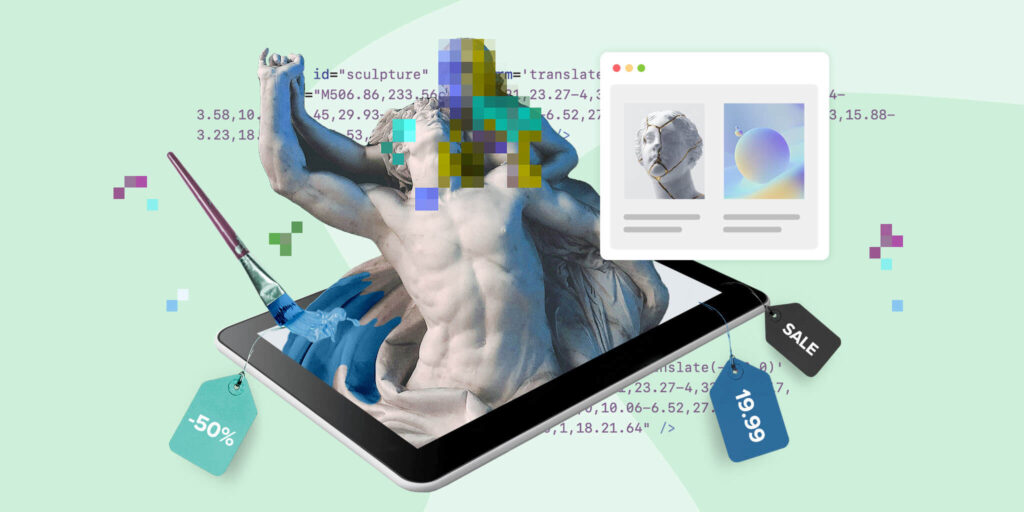
When choosing the best ecommerce platforms for artists, it’s essential to prioritize user-friendly interfaces, robust customization options, and seamless integration with artistic content. Platforms like Shopify and BigCommerce stand out for their extensive feature sets tailored to scaling online art businesses, offering tools for inventory management, multi-channel selling, and sophisticated analytics.
WooCommerce, as a WordPress plugin, provides unparalleled flexibility and ownership of content, ideal for artists seeking complete customization. Squarespace appeals with its visually-focused templates and integrated ecommerce functionality, making it easy to showcase art beautifully.
If you need simplicity, platforms like Wix and Sellfy offer intuitive interfaces and built-in tools for marketing and sales, while Branchbob provides a niche focus on artistic products with customizable storefronts and straightforward setup processes. Each platform varies in pricing and features, catering to different needs from beginner artists to established galleries looking to expand online.
How to Choose from the Best eCommerce Platforms for Artists
- Assess your specific needs as an artist, including the features, customization options, and scalability required to effectively showcase and sell your artwork online.
- Compare the offerings of various ecommerce platforms, evaluating their suitability for artists in terms of visual merchandising tools, multi-channel selling capabilities, and ease of use.
- Evaluate the performance metrics of potential platforms, particularly their site loading times and uptime guarantees, as these can impact the user experience and sales conversions.
- Look for ecommerce platforms that offer specialized features for artists, like integration with print-on-demand services or the ability to sell digital downloads.
- Review the pricing structures of the platforms, considering not just the initial costs but also any transaction fees, subscription renewals, or hidden charges that may impact your profitability.
Pros and Cons of the Best eCommerce Platforms for Artists
Pros
- Provide robust visual merchandising tools, enabling artists to effectively showcase their creative works and attract potential customers.
- Offer seamless multi-channel selling capabilities, allowing artists to expand their reach and visibility across various online marketplaces.
- Grant unlimited product listings, storage, and bandwidth, accommodating the scalability needs of artists as their businesses grow.
- Include a wide selection of free or affordable apps and integrations, empowering artists to enhance the functionality of their online stores.
- Deliver secure payment processing and data protection, ensuring a safe and trustworthy shopping experience for customers.
Cons
- Offer a limited range of customization options, potentially restricting the artistic expression and branding of artists’ online stores.
- Charge higher subscription fees or transaction costs, which can impact the profitability of artists’ businesses, particularly in the early stages.
- Vary in the quality of customer support, with some platforms offering slower response times or less helpful assistance, which can be frustrating for artists.
- Enforce long-term contracts or cancellation fees, reducing the flexibility for artists to switch platforms if they become dissatisfied with the service.
GET SMARTER >>> HostGator vs SiteGround Website Builders
What to Watch Out For
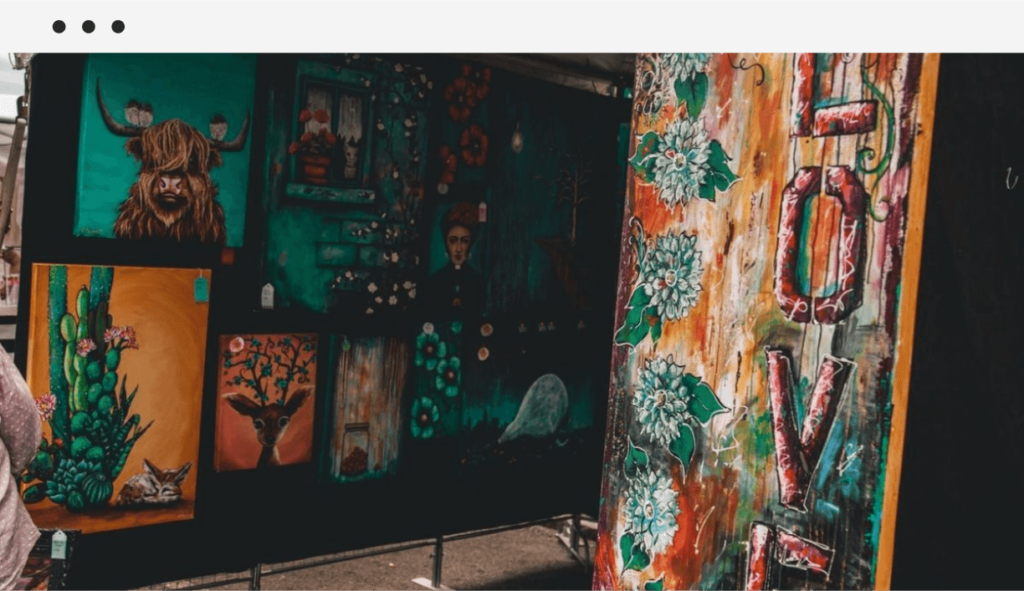
- Integrate marketing tools and optimize for search engines to reach more customers effectively.
- Utilize features like customer reviews, artist bios, and social media integration to foster a supportive artist community.
- Ensure the platform allows extensive customization beyond templates to reflect your artistic style.
- Clarify the fee structure, including monthly fees and percentage of sales, to avoid surprises.
- Check for essential features like high-quality image uploads, variant management, and digital download capabilities.
Pro Tips
- Focus on visual appeal and customization options to reflect your artistic style.
- Prioritize platforms that integrate with your preferred creative tools.
- Ensure the platform supports secure digital downloads for your products.
- Build a community around your art with engagement-focused features.
- Choose a scalable platform that can accommodate your growing business needs.
Recap
For artists looking to sell their work online, several top ecommerce platforms offer unique benefits. WooCommerce stands out for its flexibility and integration with WordPress, ideal for artists who want full customization. Shopify provides a robust solution with scalable options and extensive app integrations, perfect for growing businesses.
Big Cartel offers simplicity and artistic-focused templates, ideal for artists who prefer a straightforward setup. Wix and Squarespace both excel in visual design and ease of use, making them great choices for artists seeking aesthetically pleasing online stores without extensive technical knowledge. Each platform caters to different needs, from customization and scalability to simplicity and visual appeal, allowing artists to find the best fit for showcasing and selling their art online.






